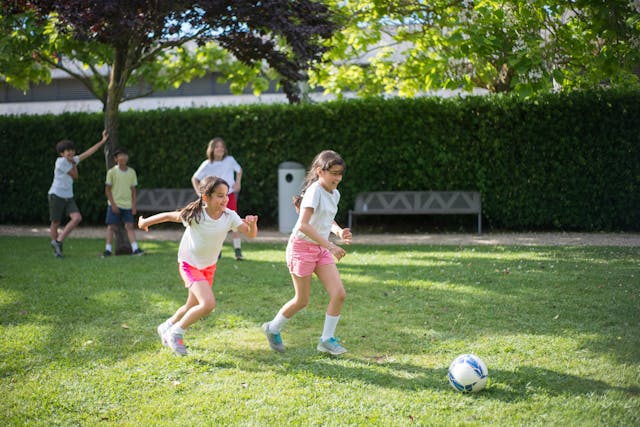The Impact of Helicopter Parenting on Child Development
In the realm of modern parenting, there exists a term that encapsulates a particular approach to nurturing and guiding children, an approach that is both well-intentioned and, at times, inadvertently detrimental. This term is “helicopter parenting”.Characterized by an excessive level of involvement, control, and hovering over their children’s lives, helicopter parents are individuals who strive to shield their offspring from every potential adversity.
The concept of helicopter parenting has garnered increasing attention in recent years, reflecting the growing concern and interest within society about its potential impacts on child development. This article delves into the nuances of this parenting style, exploring its definition, traits, and effects on children, and even offering signs that one might have been raised by helicopter parents. By examining both the benefits and drawbacks of such an approach, this article aims to provide a comprehensive understanding of helicopter parenting’s implications.
As we navigate through the various aspects of this parenting phenomenon, we will shed light on its effects on children’s growth and development, offering insights into striking a balance between supportive nurturing and excessive control. Through examining real-life examples, case studies, and expert opinions, we embark on a journey to better comprehend the impact of helicopter parenting and how it shapes the lives of the children who experience it.
Helicopter Parenting Definition

Helicopter parenting, a term coined in the early 1960s by Dr. Haim Ginott, describes a style of parenting where parents are highly involved in their children’s lives, often to an extreme degree. This approach is rooted in good intentions, aiming to ensure children’s safety and success. However, it can inadvertently hinder a child’s growth and development.
Characteristics of Helicopter Parenting
The origins of helicopter parenting can be traced back to a desire to protect children from potential harm and difficulties. This style of parenting often stems from a well-meaning need to shield children from life’s challenges. Helicopter parents are typically deeply invested in their children’s lives, seeking to guide every aspect, from schoolwork to extracurricular activities.
One defining aspect of helicopter parenting is the excessive involvement and control exerted by parents. These parents tend to hover over their children, monitoring their activities closely. They might intervene in their child’s interactions with peers, teachers, and even in minor conflicts. The goal is to ensure success and prevent failure, but this level of control can stifle a child’s autonomy and problem-solving skills. The result is often a lack of independence and self-reliance in children.
Helicopter Parenting Style: Traits and Behaviors

Exploring Traits and Behaviors
Helicopter parents tend to display several consistent traits and behaviours. They often have a strong desire to shield their children from failure or disappointment. This might involve constantly monitoring their child’s activities, grades, and friendships. They may also struggle with delegating responsibilities to their children and feel compelled to manage every aspect of their lives.
Motivations: Fear and Overprotectiveness
The motivations behind helicopter parenting are often rooted in fear and overprotectiveness. Parents may fear that their child’s future success hinges on avoiding any setbacks, leading them to intervene excessively. Overprotectiveness can stem from a genuine concern for the child’s well-being, but it can inadvertently hinder the child’s ability to develop coping skills and resilience.
Manifestations in Daily Life
Helicopter parenting can manifest in various ways in daily life. Parents might constantly remind their children about homework assignments, even completing tasks for them. This may sometimes be seen as emotionally absent. They might be overly involved in their child’s extracurricular activities, making decisions on their behalf. In school settings, helicopter parents might advocate aggressively for their child, intervening in disagreements with teachers or classmates. This constant monitoring and intervention can create a stifling environment for the child, impacting their ability to learn and grow independently.
Helicopter Parenting Effects on Children

Examining Negative Impacts
Helicopter parenting’s effects on child development can be complex and far-reaching. While the intention is often positive, the outcomes may not always align. Overinvolvement can lead to a range of challenges for children as they navigate their formative years.
Hindering Essential Skill Development
One of the primary concerns is the hindrance of essential skill development. Children raised under helicopter parenting might struggle with independence, lacking the ability to make decisions or solve problems on their own. The constant presence of a parent to guide every step can impede the development of self-reliance and decision-making skills.
Links to Emotional, Social, and Academic Challenges
Research findings consistently indicate that helicopter parenting can lead to emotional, social, and academic challenges. Children raised under this style might experience higher levels of anxiety and lower self-esteem. The lack of opportunities to face and overcome challenges can inhibit their ability to cope with stress and adversity in the future. Additionally, they might find it challenging to build meaningful relationships with peers due to a lack of social skills honed through independent interactions.
Research and Studies
Numerous studies have explored the effects of helicopter parenting. Research has found correlations between this parenting style and increased rates of anxiety, depression, and reduced academic performance among children. Longitudinal studies have highlighted the long-term implications, showing that children raised by helicopter parents might struggle with autonomy and decision-making even into adulthood.
Signs Helicopter Parents raised you

Identifying Common Signs
Several telltale signs can indicate an upbringing by helicopter parents. These signs reflect the impact of the overinvolved parenting style on a person’s behavior, mindset, and approach to challenges. Hence they are as important as choosing the right preschool for children that can lead to disasters if anything went wrong. Let’s now get to the common signs of a helicopter parent;
- Overdependence on Guidance: Individuals raised by helicopter parents might struggle with making decisions independently. They might seek constant validation and approval before taking action.
- Avoidance of Risk: A tendency to avoid taking risks or trying new things can be indicative of being raised under overprotective parenting. The fear of failure, rooted in parental expectations, can lead to risk aversion.
- Low Self-Esteem: Constant scrutiny and intervention might result in lower self-confidence. Individuals might doubt their abilities and require external validation to feel competent.
- Difficulty Handling Criticism: Constructive criticism might be challenging to accept due to a lack of experience in facing failures or making mistakes on their own.
- Struggles with Independence: Basic life skills like cooking, laundry, or managing finances might pose difficulties as these individuals were rarely given opportunities to manage tasks independently.
Anecdotes and Real-Life Examples
To make these signs relatable, consider an individual who hesitates to accept a job offer because they fear making the “wrong” choice without parental input. Another might struggle to handle disagreements with friends since they’ve never navigated conflicts independently. Such real-life scenarios illustrate how the traits resulting from helicopter parenting can impact daily life decisions and interactions.
Breaking Free from Helicopter Parenting
Tips and Strategies for Overcoming Effects
For individuals who grew up with helicopter parents, breaking free from its impact requires conscious effort and resilience. Seeking therapy or counselling can provide a safe space to unpack and address the challenges resulting from this upbringing.
Importance of Self-Awareness and Boundaries
Self-awareness is paramount. Recognizing the tendencies and behaviours rooted in helicopter parenting enables individuals to actively work toward change. Setting healthy boundaries with parents is crucial, communicating the need for autonomy while appreciating their concerns.
Fostering Independence and Personal Growth
To foster independence and personal growth, individuals can gradually challenge themselves to make decisions and handle responsibilities without constant guidance. Setting small goals and celebrating achievements can build confidence. Exploring new interests, hobbies, or career paths can expand horizons beyond parental expectations.
Cultivating Supportive Relationships
Cultivating supportive relationships outside the family circle can provide additional perspectives and encouragement. Friends, mentors, and role models can offer guidance and contribute to a well-rounded support system.
Embracing Mistakes as Learning Opportunities
Learning to embrace mistakes as valuable learning opportunities is essential. Overcoming the fear of failure requires a shift in mindset, allowing room for growth through experience.
Balancing Parental Involvement

- Necessary and Beneficial Involvement: Acknowledge that parental involvement is vital for a child’s well-being and development. It provides guidance, support, and a sense of security that contributes to healthy growth.
- Striking a Balance: Highlight the importance of finding a balance between being overly hands-on and distant. Recognize that too much intervention can hinder a child’s independence, while too little involvement might leave them feeling unsupported.
- Middle Ground of Balanced Parenting: Discuss the concept of balanced parenting, where parents empower their children while still providing a safety net. This involves knowing when to step in and when to let children navigate challenges independently.
- Supportive and Nurturing Style: Offer insights into adopting a parenting style that nurtures growth. Encourage open communication, active listening, and creating an environment where children feel comfortable discussing their experiences and seeking guidance.
- Allowing Natural Consequences: Allow children to experience the natural consequences of their actions, both positive and negative. This teaches them responsibility and accountability.
- Promoting Decision-Making Skills: Encourage decision-making from an early age, allowing children to learn from their choices. Offer guidance without taking over the decision-making process.
- Celebrating Effort and Progress: Focus on celebrating effort and progress rather than just outcomes. This promotes a growth mindset and encourages children to embrace challenges.
- Instilling Confidence: Help children build confidence by letting them take on tasks and responsibilities gradually. Offer praise and support, fostering a sense of competence.
- Flexible Adaptation: Recognize that parenting strategies need to adapt to the child’s age and developmental stage. As children grow, the level of involvement and support required will change.
- Lead by Example: Model balanced behaviour and decision-making in your own life. Children often learn by observing their parents’ actions and attitudes.
- Continual Learning: Parenting is a continuous learning process. Be open to feedback, seek advice from experts or experienced parents, and adjust your approach as needed
Conclusion
In delving into the world of helicopter parenting, we’ve explored its multifaceted dimensions and effects on child development. We began by defining this pervasive parenting style characterized by excessive involvement and control. The concerns surrounding helicopter parenting are not without merit, as its influence on children’s growth can be complex and far-reaching. We’ve uncovered how it hinders essential skill development, leads to emotional challenges, and can even cast a shadow into adulthood.
The message is clear: while a degree of parental involvement is essential, a delicate balance must be struck. The middle ground between being neglectful and overbearing is where growth and independence flourish. By fostering supportive relationships, setting boundaries, and embracing mistakes as opportunities, individuals can break free from the grip of helicopter parenting’s impact.









